Staff training welcome pack
About e-DESK
ABOUT e-DESK
e-DESK is a project co-funded by the European Union and implemented by a consortium of five international partners led by the CISE. It is a training project for university teachers in the European Union on digital skills and entrepreneurship, in response to the needs that the COVID-19 pandemic has highlighted in terms of hybrid education and digital and entrepreneurial response at university level.
Its objective is to strengthen the digital and entrepreneurial skills of teachers by designing a hybrid teaching methodology that also understands the use that students make of technology, in order to bring education closer to the whole group of students, in accordance with current demands.



The training itinerary
The staff training is a three-day training event for the staff of eDESK partner organizations that will take place from July 4 to 6 on the campus of NOVA University Lisbon.
Participation in the event is completely free of charge and includes travel, accommodation, and living expenses, with the condition of active participation in the whole training.
The staff training is part of e-DESK’s training itinerary for university educators. This blended training itinerary combines a MOOC and the face-to-face training you will be enjoying in Lisbon. Please, review as many modules as possible before joining us in Lisbon, it will ease the collaboration in Lisbon. The e-DESK team recommends completing at least the first six modules.
After completing the training, the e-DESK project would like your collaboration in piloting the methodology in your classes. You will receive all the necessary information as well as a toolkit to help you implement the piloting.
Agenda
09.30 – 09.45 | Welcome from NOVA
09.45 – 10.00 | Project presentation – ENLIVEN
10:00 – 10.30 | Coffee break
10.00 – 11.30 | Opening Staff training session | PRP
11.30 – 13.00 | From MOOC to own reality : Assessing training needs
13.00 – 14.30 | Lunch break
14.30 – 16.00 | From MOOC to own reality : Assessing training needs II
16.00 – 17.00 | Wrap-up | Feedback & Comments
09.30 – 10.30 | Hybrid or not hybrid? That is the question.
10.30 – 10.45 | Coffee break
10.45 – 12.30 | When and why shall we use the hybrid approach?
12.30 – 14.30 | Lunch break
14.30 – 16.30 | Hybrid: How to plan, to do, to evaluate
16.30 – 17.00 | Wrap-up Feedback & Comments
09.30 – 10.30 | Hybrid: From the Global to the Institutional reality
10.30 – 10.45 | Coffee break
10.45 – 12.30 | An institutional Case From NOVA Innovation Lab IMS
12.30 – 14.30 | Lunch break
14.30 – 16.00 | Assembling a customized portfolio
16.00 – 17.00 | Wrap-up and take home messages
Meet the trainers

Patricia Rosado Pinto
Patricia Rosado Pinto has recently retired from Universidade Nova de Lisboa. She holds a PhD in Education and at NOVA Medical School she was responsible for the Medical Education Office. She was also a member of NOVA Rectoral Team, as Pro-Rector, and coordinated NOVA Forma, a strategic program integrating NOVA Doctoral School, NOVA Pedagogical Innovation and NOVA Edu_ Digital offices.
She has been involved in several national and international teachers’ training programs and in educational consultancy. Her fields of expertise and publication are Medical Education and Teaching & Learning in Higher Education.
Paulo Belo Costa
Paulo Belo Costa is an Instructional Designer at NOVA University Lisbon / NOVA Pedagogical Innovation. His role involves designing and planning pedagogical content, supporting faculty in the field of TEL (Technology Enhanced Learning) and collaborating in national and international projects related to the development of pedagogical and digital skills.
He has a degree in Physics and a background in e-Training, Digital Illustration, Web Design and Graphic Design. In terms of visual arts and graphic design, he has developed projects in different areas (drawing, illustration, painting, modelling, digital design and animation).
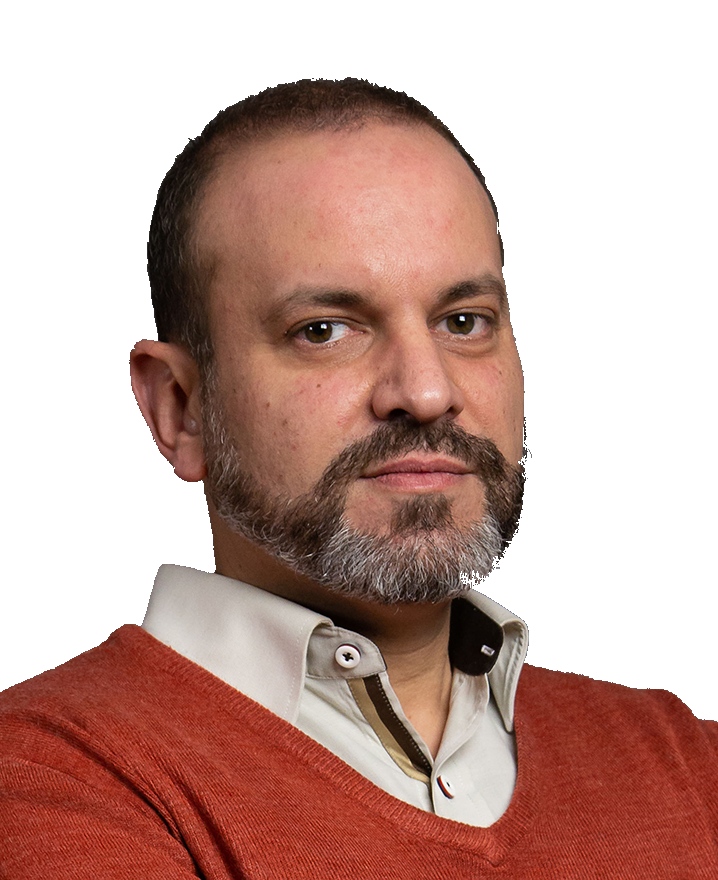
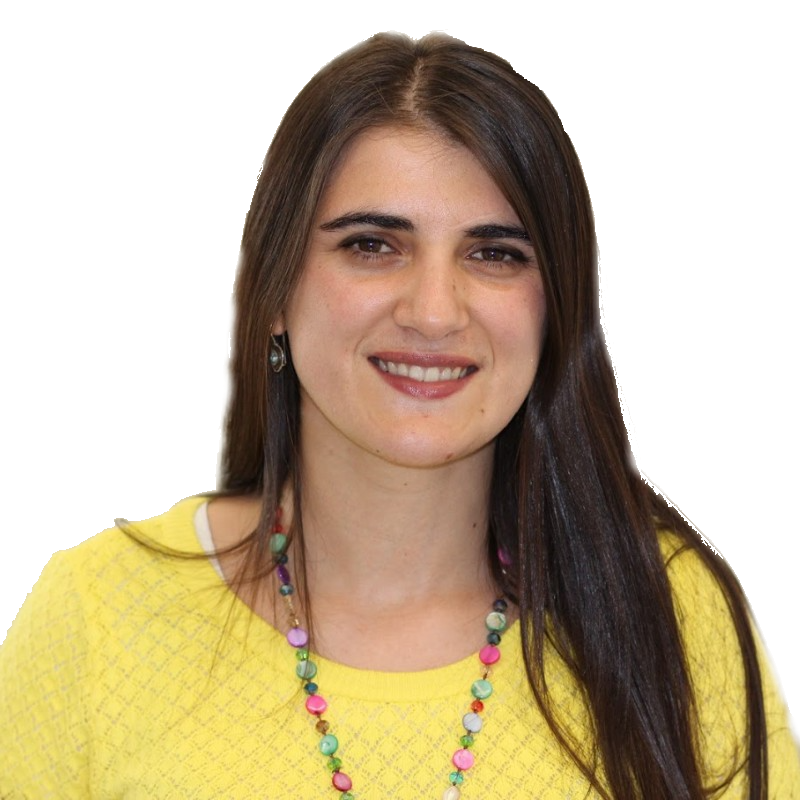
Elsa Caetano
Elsa Caetano is responsible for the implementation of the educational strategy for NOVA University aligned with the institutional strategy, focused on the implementation of pedagogical innovative methods across the university. The portfolio includes staff development and training, development of transversal competences, such as research skills development, project management, digital and career management skills, as well as an education for the sustainability challenges.
How to arrive
Lisboa airport is 10 km from the city center. When you arrive you will find 3 possibilities to get to the Rectorate of NOVA University Lisbon:
1. By AeroBus:
Here you can find information about the route and the ticket prices.
http://www.yellowbustours.com/en/cities/lisbon/airport-transport/
2. By Metro (subway):
Here you can find information about the route and the ticket prices. http://www.metrolisboa.pt/
To reach NOVA, you have to take the red line towards São Sebastião. From there you have to do a 10 minutes walk to NOVA (more or less).
Click here for the Metro map
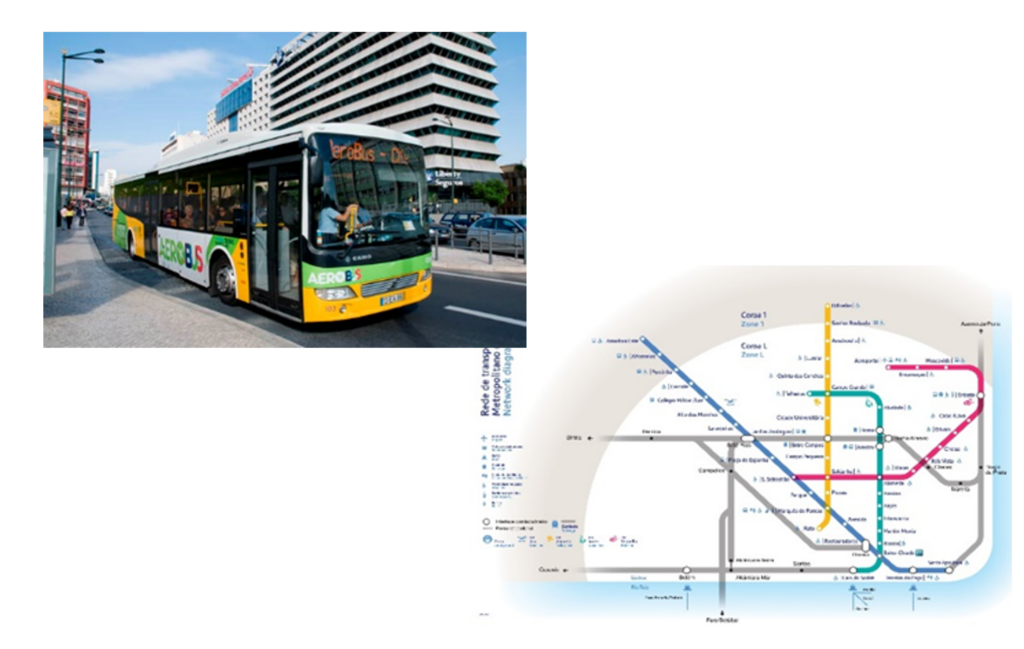
3. By Taxi:
Lisbon as a good network of taxis. During the day fares start at 3,40 euros and at 3,90 euros at night. Taxis are easily found anywhere in Lisbon. Nonetheless, please find some contacts to call a taxi at any time of the day:
- Teletaxis: +351 218 111 100;
- Autocoope: +351 217 932 756
- Retális Rádio Táxis: +351 218 119 00
4. By Uber:
Uber was the first ridesharing service in Lisbon, and although it has recent competitors, it remains the most popular. Fares tend be to slightly lower than regular taxis, but note that if you call an Uber at the airport, the car can’t stop outside the arrivals terminal and there may be some confusion figuring out your pickup location.
Hotels
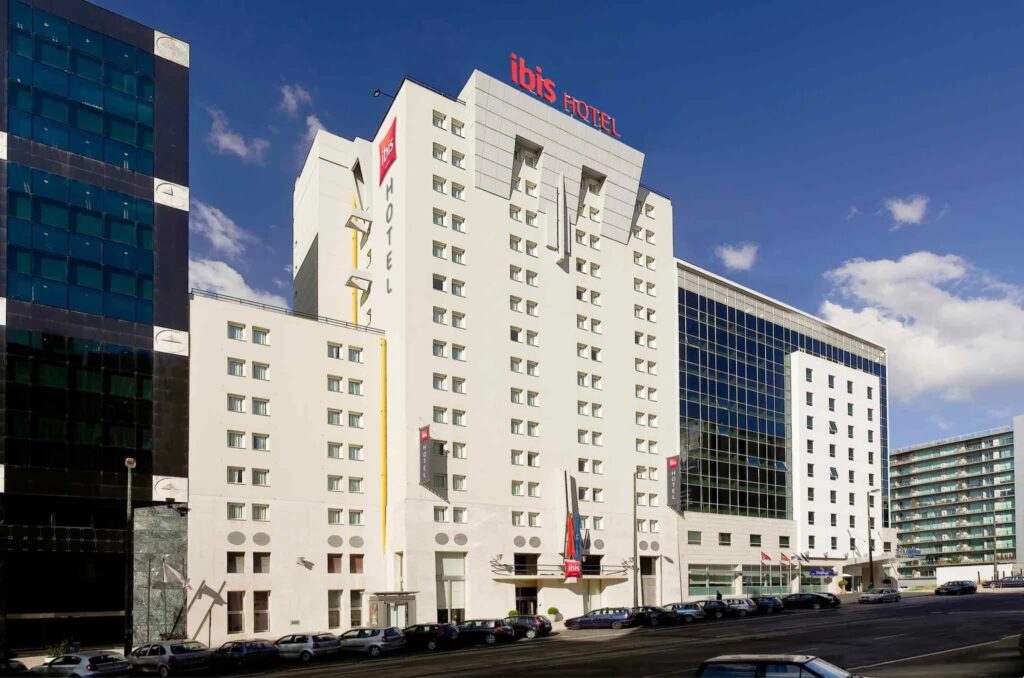
Hotel IBIS Lisboa José Malhoa
Address: Av. José Malhoa, 10, 1099-089 Lisboa
Tel.: +351 217 235 700
E-mail: H1668-AM@accor.com
For hotel location click here
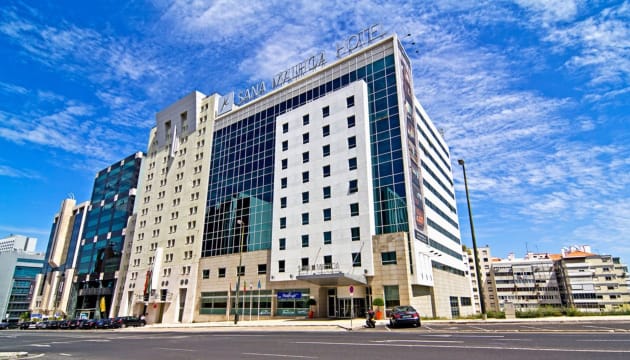
Sana Malhoa Hotel
Address: Av. José Malhoa, 8, 1099-089 Lisboa
Tel.: +351 210 061 800
E-mail: sanamalhoa@sanahotels.com
For hotel location click here
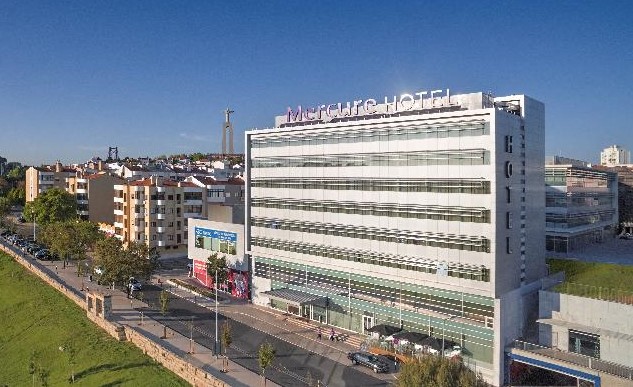
Mercure Hotel Lisboa
Address: Av. José Malhoa 23A, 1099-051 Lisboa
Tel.: +351 21 720 8000
E-mail: h3346@accor.com
For hotel location click here
Directions from Hotels to NOVA University Lisbon
Walk along Av. José Malhoa until you see Banco Popular. Turn right and take the stairs between the banks Banco Popular and Santander Totta. Turn right and follow Rua da Mesquita which leads you to Campolide Campus, where NOVA’s Rectorate building is located.

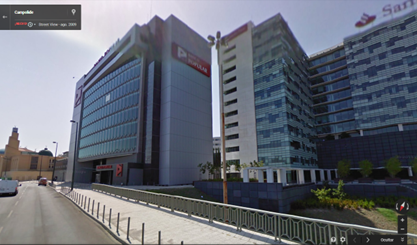
Universidade Nova de Lisboa
NOVA University Lisbon was founded in 1973 and has currently more than 19500 students, 1591 teachers and researchers, and 679 non-faculty staff. Proud of its youth as one of the most recent public universities within the Lisbon metropolitan area, NOVA spans through three municipalities, shortly, in four.
NOVA integrates 41 research units, 37 of which are funded by the Fundação para a Ciência e a Tecnologia – FCT (Portuguese Foundation for Science and Technology), including 3 associated laboratories (in partnership with other Portuguese research institutions).
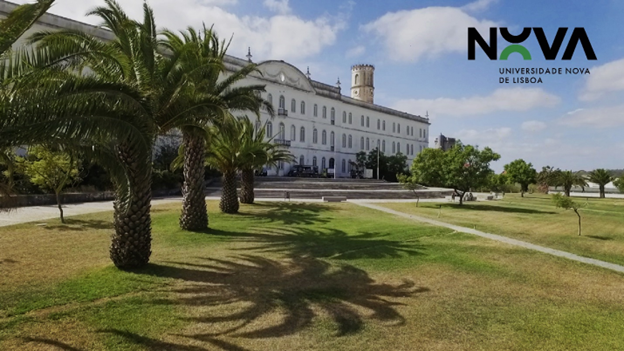
The excellent quality of research in many areas is also a cornerstone in the international culture of NOVA. Besides intense exchanges in the European space, NOVA also develops cooperation ties with Brazil and Portuguese-speaking countries, Latin-American countries as well as other regions of the world.
The university is also actively involved in cooperation actions promoted by the Portuguese Government, in particular with North-American universities, such as the University of Texas at Austin (UTA), the Massachusetts Institute of Technology (MIT) and the Carnegie Mellon University (CMU), namely in master’s courses and doctoral and research programmes.
The singularity of the Universidade NOVA de Lisboa project lies in its respect for the individuality of each Academic Unit, each having acquired its image and prestige within the freedom, diversity and tolerance that have been the guidelines of NOVA. One further aim of the project is the strengthening of the cohesion between units in order to take the best possible advantage of the synergies that can thus be generated and developed.
This clear option for a unique but diversified identity, working not only as a
network of institutions but also of projects, people and resources, characterizes NOVA as a university that is open to the world and willing to take part in the challenges presented by the 21st century.

THE RECTORATE
Universidade NOVA de Lisboa Rectorate building is located in Campolide, one of Lisbon’s seven hills. The Rectorate building houses the administrative and social welfare services of the university. Designed by the architects Manuel Rocha Aires Mateus and Francisco Xavier Rocha Aires Mateus, the building was awarded the Portuguese Valmor Prize for Architecture in 2002.
Address: Campus de Campolide.
1099-085 Lisboa
Tel.: +351 213 715 600
Subway: S. Sebastião (Blue and Red lines)
Bus: 716, 718, 726, 742, 758
COLÉGIO ALMADA NEGREIROS
The activities related to the e-Desk Staff Training will take place in the Colégio Almada Negreiros, a historic building located in the Campolide Campus, right behind the Rectorate building. The room in which the activities will take place is the “Salão Nobre”.
Please click here find the location.
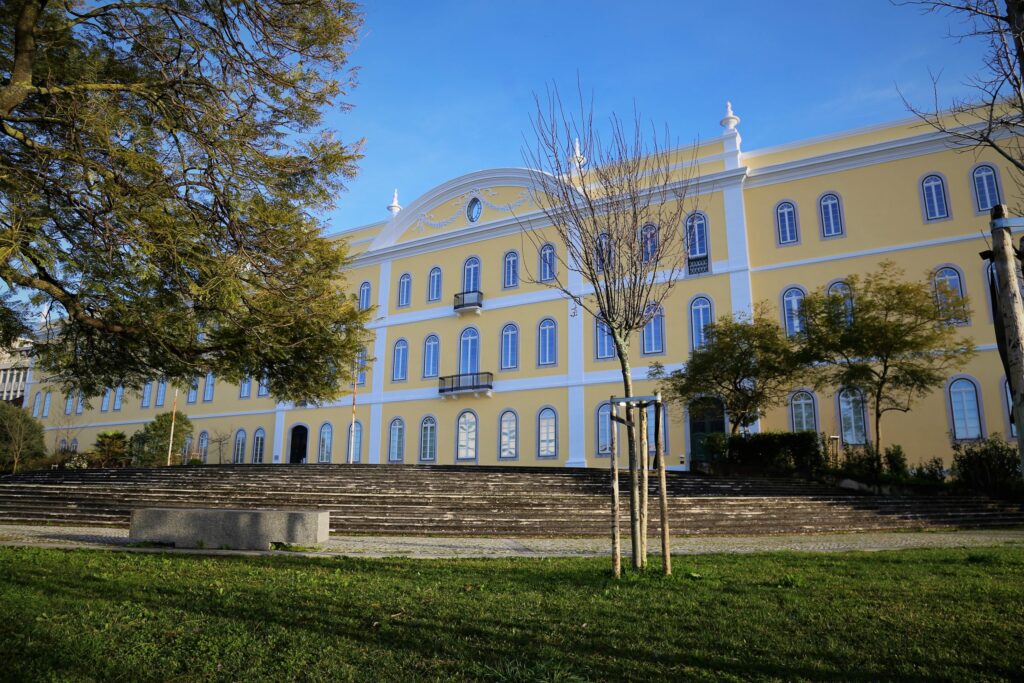
Useful information
The public transports of Lisbon have been integrated in a single structure that includes:
- Metro: subway
- Carris: bus and tram
METRO (subway) – https://www.metrolisboa.pt/
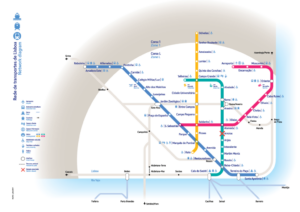
CARRIS (bus and tram) – https://www.carris.pt/en/
Non-frequent tickets
- Carris/ Metro single ticket – 1,50€ (Valid for one journey in the Carris/Metro whole network, during 1 hour after the first validation)
- 1 day ticket Carris/ Metro network (24h) – 6,40€ (valid in the Carris/Metro whole network for 24 hours after the first validation).
- Carris (bus) On-Board fare – 2,00€
- Carris (tram) On-Board fare – 3,00€
- On-Board fare for Bica, Glória and Lavra Elevators – 3,80€ (up to 2 journeys)
- Santa Justa Elevator – 5,30€ (up to 2 journeys, including access to the viewpoint).
Rechargeable Tickets: “7 colinas and Viva viagem”
“7 colinas and Viva viagem” cards have exactly the same purpose and just differ on name and image. They are rechargeable and cost 0,50€. They’re valid for Carris and Metro and can be charged with the following types of transport titles:
- Valid only for Carris: One zone ticket;
- Valid for Carris and Metro: 24 hours ticket Carris/Metro Network;
- Valid for Carris, Metro and Transtejo/Soflusa: Zapping
Zapping
Zapping consists in charging money onto a “7 Colinas/ Viva Viagem” which is deducted as the customer validates the card on different transports, according to the prices in each operator.
* This transport title is not valid neither in touristic circuits nor in special bus services to the Airport. 1st fare load: minimum 3€, maximum 40€.
LISBOA CARD
Access Card for the Museums, Public Monuments and transportation including of buses, cable cars, trams, trains on Sintra – Cascais railroad and – 50% of discount over the entrance fee of many other places. You can buy it online at: http://www.askmelisboa.com/web-store/pesquisa-lisboa-card.html
Adult fare: 24h – 19€; 48h – 32€; 72h – 40€.
The city of Lisbon

Lisbon is the capital city of Portugal and lies on the north bank of the Tagus estuary where it broadens to enter the Atlantic Ocean. Lisbon is Portugal’s largest city and its cultural, administrative, commercial and industrial hub. The name comes from “Olissipo”, which has its origins in the Phoenician words “Allis Ubbo”, meaning “enchanting port”. Built on seven hills overlooking the Tagus river, Lisbon is a historic capital where 800 years of cultural influences mingle with modern trends and life styles creating spectacular contrasts.
The international press highlights Lisbon as a dynamic and cosmopolitan city, with a warm climate all year round, where visitors can enjoy the colourful streets, the yellow trams that run along the cobblestone floors and explore historic monuments and museums.
Lisbon also has a vibrant night life and a rich musical culture, of which we highlight Fado, urban popular song of Portugal that was recognized by UNESCO as an Intangible Cultural Heritage of Humanity in 2011.
Touristic attractions

St. George’s Castle
Located in the historic Alfama district, this brooding Moorish castle dominates the city from its vantage point atop Lisbon’s highest hill.
St. George’s Castle
Address: St. George’s Castle
Tel.: +351 218 800 620
Bus: 737
Tram: E12, E28
Schedule:
09h00 – 21h00 (March – October)
09h00 – 18h00 (November – February)
Last admission: 30 minutes before closing time
Sé Catedral (Lisbon Cathedral)
Address: Largo da Sé
Tel.: +351 218 876 628
Bus: 737
Tram: E12, E28
Schedule: 10h00 – 19h00 (Every day)
Bairro Alto
By day, this section of Lisbon is relatively quiet with children playing in the streets and people shopping. By night, it changes into a crowd of revelers crammed into the neighborhood’s narrow streets to go clubbing and bar hopping until wee hours.
Bus: 706, 727, 758, 773
Tram: E28
Santa Justa Elevator
This elevator is located inside a gothic tower, and provides quick and easy transport between Lisbon’s Baixa and Bairro Alto districts. It is 45m high and has a belvedere that offers a magnificent view over Lisbon.
Address: Rua do Ouro and Rua de Santa Justa
Tel.: +351 214 138 679
Bus: 711, 736, 737, 746, 759, 783
Tram: E12, E15, E28
Subway: Baixa/Chiado (Green and Blue Lines)
Schedule:
07h00 – 22h00 (October-May). Last entrance 21h45.
07h00 – 23h00 (June-September) and Easter. Last entrance 22h45.
National Pantheon of Santa Engrácia
Built in 1681, Santa Engrácia Church is the National Pantheon, where the elevator inside whisks visitors to the top of the dome to enjoy a sweeping 360-degree panorama of the city below.
Address: Campo de Santa Clara
Tel.: +351 218 854 820
Bus: 712, 734
Tram: E28
Subway: Sta. Apolónia (Blue line)
Schedule:
10h00 – 18h00 (May – October). Last entrance 17h40.
10h00 – 17h00 (November – April). Last entrance 16h40.
* Closed on Mondays
Baixa-Chiado
Located between the Rossio and the Praça do Comércio, this section is a shopper’s Paradise with several pedestrian streets. Visit the Rua Augusta Arch and its belvedere. You can also find in this area the National Museum of Contemporary Art – Museu do Chiado and Lisboa Story Centre. To know Portugal’s memory visit A vida Portuguesa shop, where you can turn back time and grab a classic Portuguese product as a gif. Enjoy an ice-cream at Santini or have a coffee with the Portuguese poet Fernando Pessoa at A Brasileira.
Bus: 711, 714, 728, 732, 735, 736, 759, 760, 781, 782, 794
Tram: E12, E15, E25, E28
Subway: Baixa/Chiado (Green and Blue lines)
Rua Augusta Arch
Address: Rua Augusta, 2
Tel.: +351 210 312 700
Schedule: 09h00 – 19h00
National Museum of Contemporary Art – Museu do Chiado
Address: Rua Serpa Pinto, 4
Tel.: +351 213 432 148
Schedule:
10h00 – 18h00 (Tuesday – Sunday). Last entrance 17h30.
Lisboa Story Center
Address: Praça do Comércio, 78
Tel.: +351 211 941 099
Schedule: 10h00 – 20h00. Last entrance 19h00.
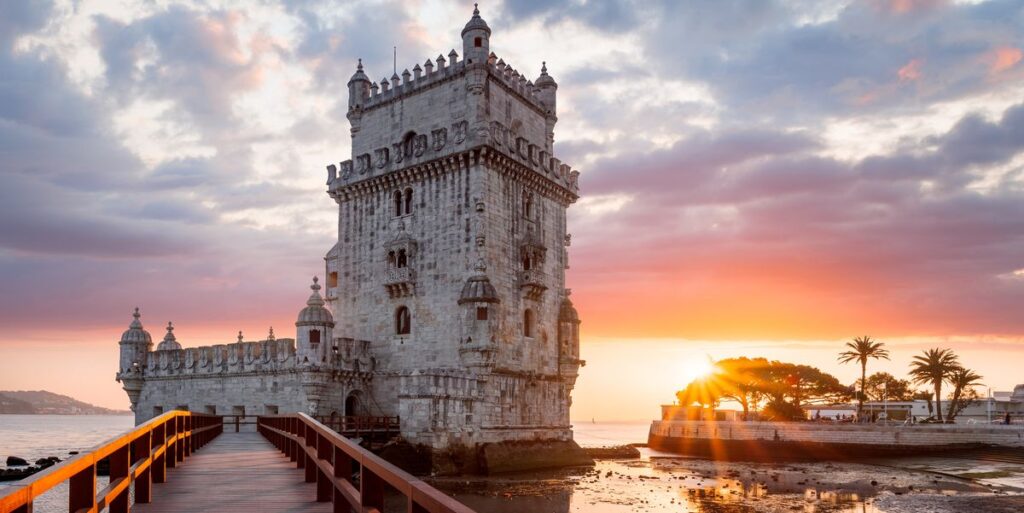
Expo ‘98/ Parque das Nações
Legacy of 1998 Lisbon World Exposition under the Oceans theme. Visit the Oceanarium, the Lisbon Casino and the Pavillion of Knowledge Ciência Viva alongside with the Tagus River.
Bus: 400, 705, 708, 725, 728, 744, 750, 759, 781, 782, 794
Subway: Oriente (Red line)
Oceanarium
Address: Esplanada D. Carlos I
Tel.: +351 218 917 000
Schedule:
10h00 – 20h00 (Summer time). Last entrance 19h00.
10h00 – 19h00 (Winter time). Last entrance 18h00.
Lisbon Casino
Address: Alameda dos Oceanos
Tel.: +351 218 929 000
Schedule:
15h00 – 03h00 (Sunday – Thursday)
16h00 – 04h00 (Friday, Saturday and holiday’s eves).
Pavillion of Knowledge Ciência Viva
Address: Alameda dos Oceanos
Tel.: +351 218 917 100
Schedule:
10h00 – 18h00 (Wednesday – Friday)
11h00 – 19h00 (weekends and holidays)
* Closed on Mondays.
Calouste Gulbenkian Foundation and Museum
Calouste Gulbenkian is one of the most important foundations in Europe, whose headquarters in Lisbon house a museum, a Modern Art Centre and an Art Library. The foundation was bequeathed by the last will and testament of Calouste Sarkis Gulbenkian (1869-1955), an Armenian collector who assembled more than 6000 pieces from all over the world and that are now in the museum.
Address: Av. de Berna, 45ª
Tel.: +351 217 823 000
Calouste Gulbenkian Foundation
Schedule:
09h00 – 13h00 and 14h30 – 17h30 (Monday – Friday)
Calouste Gulbenkian Museum
Schedule:
10h00 – 18h00. (Tuesday – Sunday). Last entrance 17h30.
Museu Nacional de Arte Antiga
The museum is home to the most important Portuguese public collection of art, as well as decorative arts from Europe, Africa and Far East, ranging between the Middle Ages and the beginning of the Contemporary Era.
Address: Rua das Janelas Verdes
Tel.: +351 213 912 800
Schedule: 14h00 – 18h00 (Tuesday)
10h00 – 18h00 (Wednesday – Sunday)
Belém
Historic and monumental walking area, with a pleasant neighbourhood and calm surroundings.
One of the most imposing symbols of the city is here – the Mosteiro dos Jerónimos, as well as the Tower of Belém and Padrão dos Descobrimentos. The first two are World Heritage sites. You can also visit the Maritime Museum, the National Archaelogical Museum and CCB – Centro Cultural de Belém, where you’ll find the Museum Coleção Berardo. You cannot visit the city without trying the famous Pastéis de Belém.
Bus: 714, 727, 728, 729, 751
Tram: E15
Train: Belém (Cascais line)
Mosteiro dos Jerónimos
Address: Praça do Império
Tel.: +351 213 620 034
Schedule:
10h00 –17h30 (October – April). Last entrance 17h00.
10h00–18h30 (May – September). Last entrance 18h00.
Tower of Belém
Address: Av. Brasília
Tel.: +351 213 620 034
Schedule:
10h00 – 17h30 (October – April). Last entrance 17h00.
10h00 – 18h30 (May – September). Last entrance 18h00.
Padrão dos Descobrimentos
Address: Av. Brasília
Tel.: +351 213 031 950
Schedule:
10h00 – 18h00 (October – February). Tuesday to Sunday. Last entrance 17h30.
10h00 – 19h00 (March – September). Every day except Mondays on March. Last entrance 18h30.
Maritime Museum
Address: Praça do Império
Tel.: +351 213 620 019
Schedule:
10h00 – 17h00 (October – April).
10h00 – 18h00 (May – September).
National Archaeological Museum
Address: Praça do Império
Tel.: +351 213 620 000
Schedule:
10h00 – 18h00 (Tuesday – Sunday). Last entrance 17h45 at the main door. Some exhibits close from 12h00 to 14h00.
CCB – Centro Cultural de Belém
Address: Praça do Império
Tel.: +351 213 612 400
Schedule:
08h00 – 20h00 (business days)
10h00 – 18h00 (Weekends and holidays).








